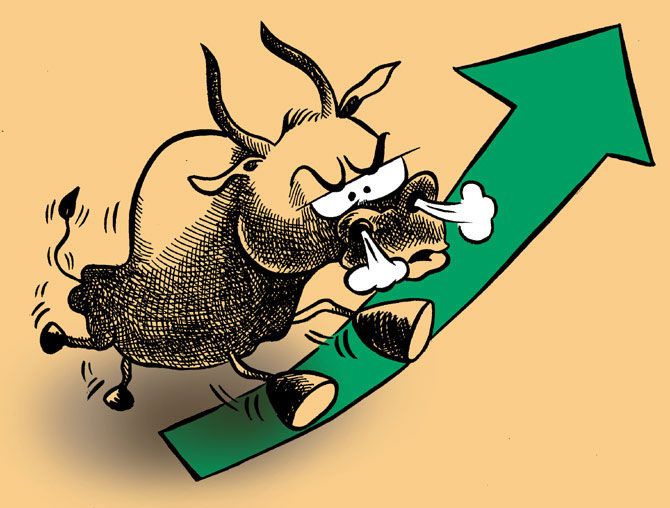India's growth is less dependent on global developments. Therefore, it offers solid growth at a time when you're really seeing a lot of downside risks in many major economies, including China, says Mixo Das, India strategist for financial major Nomura.
Illustration: Uttam Ghosh/Rediff.com.

Asian markets face many headwinds in the first half of 2017, says Mixo Das, Southeast Asia equity strategist at Nomura.
 Das, left, tells Samie Modak/Business Standard that India is better-placed given its low export dependence and it should outperform Asian peers this year.
Das, left, tells Samie Modak/Business Standard that India is better-placed given its low export dependence and it should outperform Asian peers this year.
United States President Donald Trump reiterated his protectionist stance in his inauguration speech. How big is this a risk for equities?
It is a big risk.
On an absolute basis, maybe all markets might go down. It is very difficult for a market to go up when everything else is falling.
So far, we don't know how far he will go with this. But it is clear there will be some kind of protectionism by the US.
It could end up being some minor tax adjustments.
But it could even be significant tariffs for specific countries like China or Mexico. So clearly, that is a major downside risk for Asian economies.
Given there isn't much clarity yet, we haven't factored it in our forecasts.
So far, we haven't seen much adverse reaction from the markets?
From the Asian perspective the most important thing is the growth differential. So what matters is not just the growth here in Asian countries but also growth in the US.
The best way to judge the growth in the US is probably to just look at the US 10-year bond yield. From a protectionist standpoint, most people haven't fully assumed the negative impact on the Asian economies simply because we don't much information right now.
Similarly, economists have not yet fully factored in what could happen in the US. Our rates strategist in the US thinks the 10-year bond yields could go up to 2.8-3 per cent by the middle of this year. This will translate into negative reaction for the Asian markets.
If the US yields harden to three per cent, how will capital flows into Asia be impacted?
The outflows we have seen so far are nothing compared to inflows we saw from 2009. If we see further increase in US bond yields, I would assume more outflows. Markets that are more sensitive to capital flows -- where the share of foreign trading to total trading is higher -- will be affected more.
India will be less impacted by portfolio outflows simply because its foreign trading share is lower. The foreign trading share for India is 20 to 25 per cent whereas for some other Asian markets it is more than 50 per cent.
Given the headwinds, what is the outlook for India and other Asian markets in 2017?
Our full-year outlook for Asia, excluding Japan, is quite flat.
We think the first half of 2017 will be more challenging and the second half will be better.
In the first half, we are also seeing more risks not just due to US bond yields but also from China and from property prices. All these factors will combine to make for a challenging first half. Even within this overall V-shaped pattern for 2017, we will see differentiation by countries.
India at this point is actually our biggest overweight market in Asia.
Given the weak near-term outlook, how do you play the market?
I would consider taking profits some time soon. The stocks that you are holding have done well, then maybe it is time to book profits. However, in line with our V-shaped assumption, I would be looking to buy closer to the end of the second quarter.
What are the reasons for Nomura's overweight stance on India?
India's growth is less dependent on global developments. Therefore, it offers solid growth at a time when you're really seeing a lot of downside risks in many major economies, including China.
So that plays in India's favour.
Its currency position is also reasonably okay. You are seeing the economy recovering from a V-shaped downturn following demonetisation.
India will be less impacted by portfolio outflows simply because its foreign trading share is lower.
From an earnings perspective, even though commodity prices have recovered a lot, India's earnings should be quite stable. Add to that the fact that valuations have come off and the earnings recovery is pretty much on track.
All these factors add up essentially for India.
India has under-performed major markets since November?
That's mainly because of demonetisation. We in fact upgraded India to our biggest overweight in December after the correction. So we kind of took that opportunity. We don't think the impact of demonetisation will last beyond a couple of quarters.
Do you expect India to outperform other Asian markets in 2017?
Yes, I expect India to outperform. On an absolute basis, maybe all markets might go down. It is very difficult for a market to go up when everything else is falling.
Which markets are most vulnerable if the US does focus on protectionism?
Countries that are more export-dependent, the likes of South Korea, China, and Taiwan. For India, the information technology sector is quite exposed. In pharmaceutical sector, the impact is not so much due to protectionism. But change of drug pricing might impact pharmaceutical sector.












 © 2025
© 2025